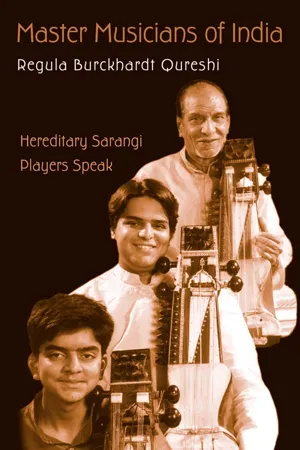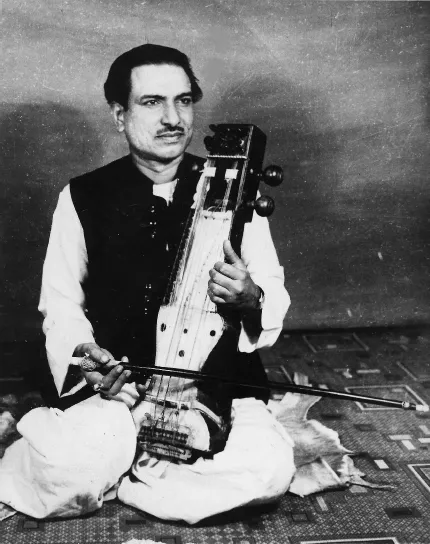
This is a test
- 360 pages
- English
- ePUB (mobile friendly)
- Available on iOS & Android
eBook - ePub
Book details
Book preview
Table of contents
Citations
About This Book
Beginning with Ravi Shankar and Ali Akbar Khan, Indian art music is renowned internationally for its improvised raga performance. This ancient tradition has for centuries been transmitted orally within the seclusion of hereditary families. Few such families remain today, and not enough is known about their central contribution to the life of Indian music. Master Musicians of India reveals this rich world through profiles and interviews of key musicians from this tradition.
Frequently asked questions
At the moment all of our mobile-responsive ePub books are available to download via the app. Most of our PDFs are also available to download and we're working on making the final remaining ones downloadable now. Learn more here.
Both plans give you full access to the library and all of Perlego’s features. The only differences are the price and subscription period: With the annual plan you’ll save around 30% compared to 12 months on the monthly plan.
We are an online textbook subscription service, where you can get access to an entire online library for less than the price of a single book per month. With over 1 million books across 1000+ topics, we’ve got you covered! Learn more here.
Look out for the read-aloud symbol on your next book to see if you can listen to it. The read-aloud tool reads text aloud for you, highlighting the text as it is being read. You can pause it, speed it up and slow it down. Learn more here.
Yes, you can access Master Musicians of India by Regula Burckhardt Qureshi in PDF and/or ePUB format, as well as other popular books in Media & Performing Arts & Music. We have over one million books available in our catalogue for you to explore.
Information
Delhi: Center of Power
CHAPTER1
Sabri Khan
Sabri Khan
My Guru, a Complete Musician
Introducing Ustad Sabri Khan
Ustad (master teacher) Sabri Khan is above all a very fine and very knowledgeable musician and a master teacher of his art. In addition, or rather, in conjunction with these two areas of competence, Sabri Khan is also a builder: of relationships and of improvements in music as well as in living. He acts as an advisor and facilitator to students and family as well as to community members, but most of all, Sabri Khan is indefatigable, always ready to undertake a task and to do what it takes to see it through.
As a result, Ustad Sabri Khan has the loyalty and attachment of his students and the respect of his peers. From an early age he helped support his elders while raising eight children. He trained and educated four sons, three as musicians and one as a commerce graduate. For his daughters he arranged marriages, three to musicians within his bradri or hereditary community, and he also looked after less-well-off relatives and bradri members. Thanks to the support of his wife and daughters, Ustad Sabri Khan has had an open and hospitable house where visitors were always welcome and tea or a meal was served any time he requested it.
While Sabri Khan worked very successfully within the classical musical milieu of Delhi and All India Radio, he was always open to change and new challenges. Starting with his first employment in the Tamil unit of All India Radio, he successfully used opportunities to learn new music and techniques, to teach foreign students, to perform for foreign audiences, and even to playforeign music with artists like Yehudi Menuhin. Living and working in the capital of the country was a crucial reason for the access Sabri Khan had to such opportunities. The fact that he could use them to his advantage over other colleagues was due to his remarkable musical competence, versatility, and intelligence. Added to this is his untiring hard work combined with an unusual flexibility and alertness to the need for helpful connections. Sabri Khan learned how to cultivate such connections not only for his own and his family’s benefit, but also for his students and others who often came to ask for his help while I was staying at his house.
Ustad Sabri Khan began his childhood and early training in Muradabad, center of his bradri (brotherhood or community of hereditary musicians). At only 14 years of age, he passed the audition at All India Radio and permanently moved to Delhi, where he built his career and his family. For many years his house in the old city was a center of music and musicians until, in 1989, the government allotted him and other eminent artists a house in the fine residential complex built for the 1988 Asiad Games. Now retired from the radio, Sabri Khan continues to perform, teach, and work on the careers of his two youngest sons, one of them a sarangi player.
For me, Sabri Khan was the ideal ustad when, in 1984, I was ready for a summer of intensive training on the sarangi. As a distant nephew of my first ustad, the late Hamid Husain Khan, he could provide continuity of style and technique, since both ustads were trained in the same local hereditary tradition centered in the town of Muradabad, not far from Delhi. Also ideal was the fact that Sabri Khan was already familiar with visiting Western students and their need for intensive, short-term attention. Despite an extremely busy professional and personal life, he generously included me in the musical life of his home and made me his disciple in both principle and practice.
After getting over a bit of initial awkwardness caused by the presence of a woman in an all-male musical environment, Sabri Khan related to me with ease; he (and I) also appreciated my husband Saleem’s culturally honed, patronlike presence at crucial junctures, especially our first meeting and, of course, the discipleship ceremony, as well as our later, more familial visits to his new house in Delhi.
In retrospect I was extremely fortunate to experience discipleship with Sabri Khan while he was still living the traditional lifestyle of Old Delhi: being surrounded by neighbors of the same professional community, starting a young son, Kamal, on the sarangi, and accepting a nephew as live-in disciple, stepping out to pray at the neighborhood mosque or getting the tea man to bring up a tray for visitors. My recordings have captured that life and its vitality when Sabri Khan was at the height of his career and achievements. On my return in 1992, I found that the family’s move to the Artist’s Complex in New Delhi led to a more modernized lifestyle adapted to a new generation of hereditary musicians with whom Sabri Khan does not hesitate to keep pace. This is best reflected in the careers of his three musician sons and of course in the progress of his many disciples that includes their finding salaried positions, the most coveted employer being All India Radio. Of his sons, the eldest, tabla player Ghulam Sarvar, had established himself as a musician in England; the teenager, Gulfam Sabri, also a tabla player, was touring in South Africa; while the young sarangi player Kamal Sarvar was making a name for himself in Delhi. And his nephew Nasir Khan had found employment in the premier Indian dance academy and became his teacher’s son-in-law. Sabri Khan’s most recent artistic initiative took him to England, where he performed the father-to-son legacy with his three sons in concerts as well as on CD.

Figure 2 Sabri Khan, portrait, Delhi, 1951.
Along with tradition, I also need to contextualize my discipleship vis-à-vis his already established record of teaching “foreign” students, most outstanding among them Daniel Neuman, thanks to whom he experienced being a visiting professor at the University of Washington, though that took place only after 1984. Even before I knew him, Sabri Khan had learned to manage basic communication with foreign students in English.
My own approach was different. I deliberately bypassed English because it was a medium through which Sabri Khan would try to enter my conversation and I would miss out on his, including that of relatives, other musicians, and students. Instead, I strove simply to join in his speech world with the result that the language between us was quite naturally Urdu. Our mostly prosaic, if occasionally poetic, conversations, and my cultural and social familiarity with Muslim Indian milieus did create a bond of understanding and social interaction between us that was remarkably special, because it was so natural.1 My abiding gratitude goes to Ustad Sabri Khan, a remarkable teacher, artist, and human being, for all his gifts—musical and simply human.
Family Training: A Tough Foundation2
Sabri Khan introduced himself most expansively during my final visit to his house after a summer of learning from him, perhaps because only then did I feel confident that he would really want to share his personal life and his advice for mine. For the last time I had arrived at the Ajmeri Gate and hailed a bicycle riksha, the only transport small enough to negotiate the narrow lanes inside the walled city of Old Delhi. Ustad Sabri Khan’s house was located in...
Table of contents
- Cover
- Half Title
- Title Page
- Copyright Page
- Table of Contents
- List of Plates
- Acknowledgments
- Note on Transliteration and Musical Notation
- Preface
- Introduction
- Delhi: Center of Power
- Bombay: Freelance Center
- Lucknow: Center of Tradition
- Benares: Center of Indian Culture
- Karachi: Center of Émigrés
- Epilogue: Memoir of an Era for the Future
- Glossary
- References
- Notes
- Index